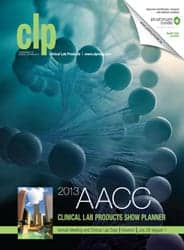by Gary Wolfe

British company specializing in near-patient diagnostics technology is preparing to take on the No. 1 killer of Americans–cardiovascular disease. The company is moving forward with a new cardiac risk test panel for point-of-care use that produces results in 60 seconds or less.
Statistics reveal what an immense challenge heart disease poses. Cardiovascular disease claims nearly 960,000 lives annually. According to the Centers for Disease Control and Prevention (CDC) and National Center for Health Statistics (NCHS), about 62 million Americans have some form of cardiovascular disease. Included in that category are heart disease, stroke, high blood pressure, congestive heart failure, congenital heart defects, hardening of the arteries, and other circulatory diseases.
Each day, nearly 680 Americans–250,000 a year–die from coronary heart disease without being hospitalized. The direct and indirect costs of cardiovascular disease in this country surpass $351.8 billion each year according to the National Heart, Lung, and Blood Institute (NHLBI). The elimination of major cardiovascular disease would add almost 7 years to the life expectancy of Americans.
Now Oxford Biosensors Ltd is taking up the battle against heart disease. Formed just 3 years ago, the company was built on medical diagnostic research conducted at the prestigious University of Oxford outside London. Its test products represent the combination of three key technologies: microelectrodes, distinctive enzyme systems, and detection systems.
The company’s new cardiac risk test provides rapid measurement of multiple parameters using a disposable strip. It detects lipid abnormalities by measuring total cholesterol, HDL cholesterol, calculated LDL cholesterol, and triglycerides. The test can be extended with the addition of other parameters. “Most testing for these blood values occurs in a central laboratory,” says Will Colón, marketing director at Oxford Biosensors. “Our tests provide a complementary method for getting these values, delivered at the point of care.”
Colón says doctors in primary care will use the rapid low-cost test to aid in the diagnosis of medical conditions without having to measure each parameter individually. Each test panel features micron-sized electrodes specific to each analyte, integrated into a low-cost plastic and carbon ink disposable. Unlike traditional reagent-based systems, these consumables do not require refrigerated storage.
The test will help identify those at risk for acute cardiac disease and can monitor patients with a known cardiac condition who are undergoing dietary and pharmaceutical therapy, says Colón.
Compared with conventional cardiac tests, the Oxford Biosensors approach offers a number of important benefits. With the OBS system, test results are available in less than a minute. Also, the test uses an extremely small sample of blood–just 5 microliters according to Colón. The CLIA—waived device is easy to use and requires little training for lab personnel and no special handling. Since the analyzer is about the size of a mobile telephone, the new cardiac test is extremely portable.
Colón says that since the testing is done by staff outside the labs, it frees up laboratory capacity for other diagnostic testing while reducing turnaround time for results. “For those lipid tests that are currently being done at the point of care, our test offers distinct advantages in terms of performance, speed, and simplicity,” he says. “Most cardiac lipid profiles at POC take at least 5 minutes and require a relatively large specimen sample.”
The cardiac risk test is the first multianalyte test to be developed at Oxford Biosensors. “We are currently finalizing the trade name for the product in light of discussions with potential marketing partners,” Colón says. The test is now in the final stages of development. He expects Oxford Biosensors to begin clinical trials early in 2004, with an eye toward formal introduction to the global market late next year.
“We anticipate building a menu of tests that can be run on our handheld analyzer platform,” Colón says. A test panel for renal care is currently in the early stages of development. Oxford is also exploring other areas for diagnostics, including liver function, statin management, neonates, metabolic syndrome, and clinical glucose monitoring.
According to Colón, Oxford Biosensors was founded by leading academics with expertise in the areas of electrochemistry, nanotechnology, materials science, and biochemistry. “These academics, in addition to other leading medical and scientific advisors from around the world, continue to guide the development of our technology platform,” he says. “The focus brought by this team of experts and our in-house research and development staff has made the advancements of the technology possible.”
“The company’s electrodes have been designed for maximum manufacturing, reliability, and economic production,” he says. The 3-year-old diagnostics company is the latest in a series of successful ventures launched at Oxford. Technology and science developed at the university have led to the formation of more than 35 companies over the years. The technology transfer arm of the University of Oxford is known as ISIS Innovation.
Diagnostic testing for renal conditions is another Oxford Biosensors concern. The renal test will help identify the onset of renal disease in patients. It measures creatinine, blood urea, potassium, and sodium, and can be extended to other parameters. Colón says the test is a convenient, accurate way of monitoring pre-dialysis patients for compliance with treatment and a tool for managing the dialysis regime for those who undergo frequent dialysis.
Oxford Biosensors’ work on the new cardiac risk test panels earned the company a SMART Award recently from the Department of Trade and Industry (DTI) in the United Kingdom. Colón says the award will advance the company’s move toward commercialization.
A governmental body, the DTI works to promote enterprise, innovation, and increased productivity. It encourages successful business start-ups and aims to increase the capacity of business, including SMEs, to grow, invest, develop skills, adopt best practices, and exploit opportunities abroad.
Colón says Oxford Biosensors has in its pipeline more fast, cost-effective tests for measuring additional analytes and addressing diseases.
Nicholas Borgert is a contributing writer for Clinical Lab Products.



